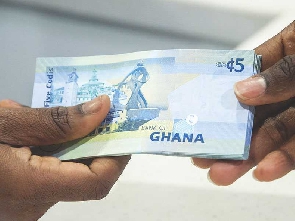The resurgence of demand in Ghana for Chinese imports has once again become a leading cause of the cyclical depreciation of the Ghana cedi, following the short-lived appreciation against the US Dollar in the first two months of 2020.
The Cedi has been depreciating in recent weeks – largely due to an increasing demand for price- discounted products from China, from suppliers looking to preserve revenues in the face of challenges posed by the coronavirus outbreak, as well as the recent strengthening of the dollar against other major international trading currencies. Goldstreet Business has learnt.
Ghanaian importers are eagerly taking advantage of the current significant price discounts on Chinese products being offered by their suppliers from inventory accumulated prior to the viral pandemic’s outbreak, as well as new production since the lifting of restrictions as suppliers seek to regain lost market share and revenues. This has largely caused the cedi to lose substantial ground to the US dollar, as outward forex transfers are on the rise.
During trading on Monday, May 4, 2020 alone, the US Dollar appreciated by 1.01 percent to sell at GHc 5.60 on the interbank currency market. The year-to-date depreciation of the cedi thus rose to 1.20 percent.
China Exports Unexpectedly Rise
Data available indicates that global exports from China unexpectedly grew by 3.5 percent year on year (y-o-y) in April 2020, in defiance of market expectations of a 12.1 percent plunge and an actual 6.6 percent fall in March.
This was the first growth in overseas sales since December 2019, amid signs of stabilizing global demand after some countries starting to ease coronavirus-induced lockdown restrictions and more firms have been resuming operations.
A source familiar with this issue in the treasury department of a major bank in the country indicates that traders in Ghana have already begun placing orders and making payments for Chinese goods, even though their current inventory levels suggest they are not needed immediately.
Apparently local importers are simply taking advantage of the hefty price discounts being offered by Chinese producers and exporters to build up inventory on the cheap.
“The Ghanaian traders are taking advantage of those discounts, although they don’t need them now. They are making payments now for the products in order to enjoy the low-cost which the products are selling at,” the source said in an interview.
“This is one reason why we have a rise in forex transfers going out of the country and this is placing more pressure on the cedi.”
The Chinese government is trying to increase economic activities, by encouraging discounts on products, following the relaxing of policies that had essentially halted economic production, the source explained. China is noted for the strong support which its private sector receives from its government and many trading counterparty countries, led by the US, accuse it of unfair trading practices
Strengthening of the US Dollar
Furthermore, the US dollar in recent weeks has gained traction on international currency markets from recent comments made by President Trump on trade with China, as well as the blame being placed on China for the spread of the coronavirus
Some currency market analysts have predicted that the re-emergence of cedi depreciation after a short-lived appreciation against the US dollar is most likely to see increase in foreign currency deposits.
External Reserves
As at the end of February, Ghana had gross international reserves (GIR) of US$10.037 billion – the highest in its history – the reserves having been propped up by the latest Eurobond issuance of US$3 billion. This was enough to cover 4.8 months of imports, more than one and a half times the 3.0 months target.
In view of the country ‘s external accounts position, it was anticipated that this was enough to ride out the coming economic slowdown, but the sheer depth of the economic crisis created by the ongoing pandemic and uncertainty as to how long it will last is creating worries. Instructively, the US$1 billion Rapid Credit Facility approved for Ghana by the International Monetary Fund is designed for countries facing unexpected, short term balance of payments challenges.
Ghana’s strong external position reflects in the stability of the cedi against the US dollar during the first quarter of this year – indeed the cedi initially actually appreciated marginally in response to the significant fall in imports from China, where the virus originated from.
Click to view details



Business News of Saturday, 9 May 2020
Source: goldstreetbusiness.com
Cedi depreciation resumes as rising demand for cheap Chinese exports soar
 Local importers are taking advantage of the hefty price discounts being offered by Chinese producers
Local importers are taking advantage of the hefty price discounts being offered by Chinese producers






![Deputy Minority Leader, Emmanuel Armah-Kofi Buah [L] and First Lady Rebecca Akufo-Addo Deputy Minority Leader, Emmanuel Armah-Kofi Buah [L] and First Lady Rebecca Akufo-Addo](https://cdn.ghanaweb.com/imagelib/pics/114/11465182.295.jpg)









